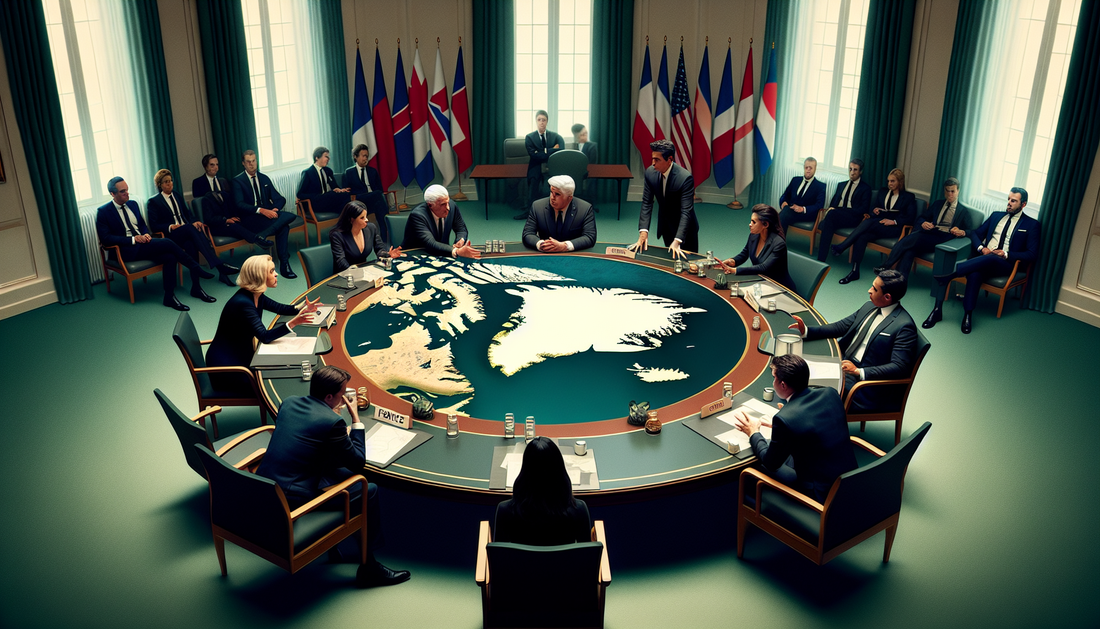
France and Germany Criticize Trump Over Greenland Sovereignty Remarks
BingoBot1.08 Summary NewsShare
Amid international diplomatic tensions, both France and Germany have openly criticized former U.S. President Donald Trump following his controversial comments regarding Greenland's sovereignty. Trump's suggestion that the United States could consider purchasing Greenland, an autonomous territory of Denmark, sparked reactions across the globe in August 2019.
- Trump remarked in mid-August 2019 about the potential acquisition of Greenland, calling it a strategic interest for the U.S.
- French officials expressed disapproval, emphasizing the importance of respecting autonomous territories and questioning Trump's diplomatic approach.
- German Chancellor Angela Merkel and other German leaders also voiced concerns, reiterating commitments to international sovereignty and territorial integrity.
- Denmark, which governs Greenland, strongly rebuffed Trump's interest, with Danish Prime Minister Mette Frederiksen calling the idea "absurd."
- Greenland's own government dismissed Trump's suggestion, asserting their intent to remain within the Kingdom of Denmark.
- The issue intensified U.S.-European relations, highlighting differences in diplomatic strategies and territorial respect.
This unprecedented diplomatic clash centered around Greenland underscores broader themes of territorial sovereignty and international diplomacy, bringing European powers France and Germany to the forefront in advocating for territorial integrity. 🌍🤝
Amidst an unexpected geopolitical debate, tensions have surfaced between Europe and the United States following a bid concerning Greenland. France and Germany have raised concerns over statements made by former U.S. President Donald Trump regarding the sovereignty of Greenland. The contention primarily revolves around Trump’s interest in acquiring Greenland, a vast island situated between the Arctic and Atlantic oceans, under Danish jurisdiction.
In a display of discontent, French and German officials underscored the importance of respecting sovereign borders. This move stands in response to Trump's remarks, which were perceived to challenge the territorial integrity of one of their European allies. The diplomatic dynamics around Greenland reflect broader questions about national sovereignty and geopolitical interests in unprecedented scenarios.
The core of the issue dates back to mid-2019, when Trump suggested the possibility of the U.S. purchasing Greenland. This proposal was met with criticism and skepticism internationally, as Denmark’s Prime Minister, Mette Frederiksen, dismissed it as "absurd." Despite the proposal being called off, it has highlighted varying international perspectives on Greenland's strategic importance.
The Historical Context of Greenland's Sovereignty
Greenland has been a self-governing territory under the Danish realm since 1979, with its indigenous Inuit population playing a significant role in its governance. The region's geopolitical importance has surged in recent years, partly due to its abundant natural resources and strategic Arctic location. The melting polar ice caps have made its vast untapped reserves of oil, gas, and minerals more accessible, raising its profile in international politics.
The United States’ historical interest in Greenland is not new. Its strategic importance was acknowledged during World War II when the U.S. established military bases on the island. In the face of a changing geopolitical landscape, Greenland remains a focal point in Arctic strategy, attracting international attention.
Reactions from European Allies
The keen interest in Greenland from the U.S. prompted a firm response from European capitals. French officials, in particular, emphasized that any discussions or decisions affecting Greenland required the involvement of both its people and Denmark. German voices echoed this sentiment, underscoring the need for respect and adherence to international norms regarding sovereignty.
This incident has further insulated the European Union’s stance on protecting its territories while simultaneously highlighting Europe's diversity in responding to U.S.-centered geopolitical strategies. Greenland's geopolitical value places it at the center of both potential cooperation and conflict in Arctic affairs.
U.S. Geostrategic Interests in Greenland
For the United States, Greenland holds significant geostrategic potential. The Thule Air Base in the northwest of the island is critical for U.S. defense strategy, providing missile warning, space surveillance, and control facilities. The Trump administration's overtures towards purchasing Greenland align with broader U.S. objectives to maintain and expand influence in the Arctic.
Economic interests also factor into the equation, as Greenland's natural resources present lucrative opportunities for extraction industries. The region's untapped reserves of hydrocarbons and rare earth elements are pivotal assets for technological and energy sectors—factoring into U.S. strategic and economic calculations.
Denmark and Greenland's Response
The proposal was criticized robustly by Danish authorities, with Prime Minister Frederiksen labeling the idea as "not for sale." This response emphasized the improbability of Greenland being made available for such transactions without considering the wishes of its populace and their right to self-determination. Greenland’s own political circles echoed Denmark’s stance, showcasing a unified defense of their sovereignty under colonial history.
While Trump's administration might have treated the idea as a practical transaction, Danish and Greenlandic stances highlight a distinction between 21st-century sovereignty and historical colonial practices. The remarks invoking historical purchase proposals could be seen as regressive in the current international framework.
International Implications and Future Prospects
The incident underlines the broader implications for international relations, particularly between the U.S. and its long-standing allies in Europe. As countries navigate these challenges, such geopolitical assertions of interest can potentially lead to diplomatic rifts or reinforce alliances through cooperative dialogue and understanding.
Close observation of policy shifts in both the European Union and the United States allows for better comprehension of the strategic realities as the Greenland debate will influence Arctic policy and diplomacy. Global diplomatic engagements will need to evolve with such complex aspects of sovereignty and strategic positioning becoming more evident.
In future negotiations or discussions about territories like Greenland, global powers might prioritize new principles that respect the existing frameworks. The need for mutually agreeable solutions rather than confrontational approaches might come to the forefront, especially in regions like the Arctic, which hold significance for international stability and environmental concerns.











